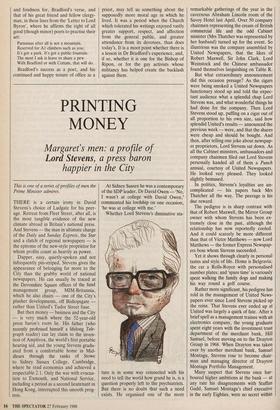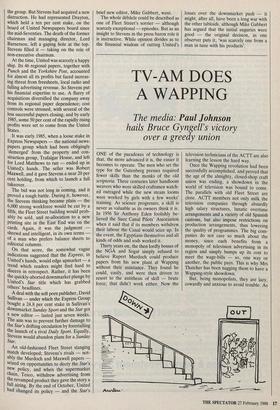PRINTING MONEY
Margaret's men: a profile of
Lord Stevens, a press baron
happier in the City
This is one of a series of profiles of men the Prime Minister admires.
THERE is a certain irony in David Stevens's choice of Ludgate for his peer- age. Retreat from Fleet Street, after all, is the most tangible evidence of the new climate abroad in Britain's national press. And Stevens — the man in ultimate charge of the Daily and Sunday Express, the Star and a clutch of regional newspapers — is the epitome of the new-style proprietor for whom profits count as heavily as power.
Dapper, easy, quietly-spoken and not infrequently pin-striped, Stevens gives the appearance of belonging far more to the City than the grubby world of national newspapers. He can usually be traced at the Devonshire Square offices of the fund management group, MIM-Britannia, which he also chairs — one of the City's plusher developments, off Bishopsgate rather than United's Tudor Street base.
But then money — business and the City — is very much where the 52-year-old press baron's roots lie. His father (who recently professed himself a lifelong Tele- graph reader) can lay claim to the inven- tion of Amplivox, the world's first portable hearing aid, and the young Stevens gradu- ated from a comfortable home in Mid- dlesex through the ranks of Stowe to Sidney Sussex College, Cambridge, where he read economics and achieved a respectable 2.1. Only the war with evacua- tion to Exmouth, and National Service, including a period as a second lieutenant in Hong Kong, interrupted this smooth prog- ress. At Sidney Sussex he was a contemporary of the SDP leader, Dr David Owen — 'No, I wasn't at college with David Owen,' commented his lordship on one occasion, `he was at college with me.'
Whether Lord Stevens's diminutive sta- ture is in some way connected with his need to tell the world how grand he is, is a question properly left to the psychiatrists. But there is no doubt that such a need exists. He organised one of the more remarkable gatherings of the year in the cavernous Abraham Lincoln room of the Savoy Hotel last April. Over 50 company chairmen representing the cream of British commercial life and the odd Cabinet minister (Mrs Thatcher was represented by her husband) turned up for the event. So illustrious was the company assembled by United Newspapers, that the likes of Robert Maxwell, Sir John Clark, Lord Weinstock and the Chinese ambassador found themselves languishing on Table R.
But what extraordinary announcement did this occasion presage? As the cigars were being smoked a United Newspapers functionary stood up and told the expec- tant audience what a splendid chap Lord Stevens was, and what wonderful things he had done for the company. Then Lord Stevens stood up, puffing on a cigar out of all proportion to his own size, said how splendid United's results — announced the previous week — were, and that the shares were cheap and should be bought. And then, after telling one joke about newspap- er proprietors, Lord Stevens sat down. As all the Cabinet ministers, ambassadors and company chairmen filed out Lord Stevens personally handed all of them a Punch annual, courtesy of United Newspapers. He looked very pleased. They looked slightly bemused.
In politics, Stevens's loyalties are un- complicated — his papers back Mrs Thatcher all the way. The peerage is his due reward.
The pedigree is in sharp contrast with that of Robert Maxwell, the Mirror Group owner with whom Stevens has been ex- tremely close in the past, although the relationship has now reportedly cooled. And it could scarcely be more different than that of Victor Matthews — now Lord Matthews — the former Express Newspap- ers boss whom Stevens succeeded.
Yet it shows through clearly in personal tastes and style of life. Home is Belgravia; the car a Rolls-Royce with personalised number plates; and 'spare time' is variously spent walking the family dogs and making his way round a golf course.
Rather more significant, his pedigree has told in the management of United News- papers ever since Lord Stevens picked up the reins. That Stevens ever ended up at United was largely a quirk of fate. After a brief spell as a management trainee with an electronics company, the young graduate spent eight years with the investment trust department of the merchant bank, Hill Samuel, before moving on to the Drayton Group in 1968. When Drayton was taken over by another merchant bank, Samuel Montagu, Stevens rose to become chair- man and managing director of Drayton Montagu Portfolio Management.
Many suspect that Stevens once har- boured higher ambitions at the bank — at any rate his disagreements with Staffan Gadd, Samuel Montagu's chief executive in the early Eighties, were no secret within the group. But Stevens had acquired a new distraction. He had represented Drayton, which held a ten per cent stake, on the board of United Newspapers board since the mid-Seventies. The death of the former chairman and managing director, Lord Barnetson, left a gaping hole at the top. Stevens filled it — taking on the role of non-executive chairman.
At the time, United was scarcely a happy ship. Its 46 regional papers, together with Punch and the Yorkshire Post, accounted for almost all its profits but faced increas- ing threat from freesheets, local radio and falling advertising revenue. So Stevens put his financial expertise to use. A flurry of acquisitions diversified the company away from its regional paper dependence; cost controls were stressed, with several of the less successful papers closing; and by early 1985, some 50 per cent of the rapidly rising profits were set to come from the United States.
It was early 1985, when a loose stake in Express Newspapers — the national news- papers group which had been obligingly `demerged' from the property and con- struction group, Trafalgar House, and left for Lord Matthews to run — ended up in United's hands. The seller was Robert Maxwell, and it gave Stevens a near 20 per cent holding, from which to launch a full takeover.
The bid was not long in coming, and it proved a tough battle. During it, however, the Stevens thinking became plain — the 6,000 strong workforce would be cut by a fifth, the Fleet Street building would prob- ably be sold, and re-allocation to a new printing site in the East End was on the cards. Again, it was the judgment shrewd and intelligent, in its own terms of a man who prefers balance sheets to editorial columns.
On that score, the somewhat vague indications suggested that the Express, in United's hands, would edge upmarket — a trend which readers might find hard to discern in retrospect. Rather, it has been the quickly-aborted downmarket plunge by United's Star title which has grabbed others' headlines.
A deal with the soft porn publisher, David Sullivan — under which the Express Group bought a 24.8 per cent stake in Sullivan's downmarket Sunday Sport and the Star got a new editor — lasted just seven weeks. The aim was to prevent further damage to the Star's drifting circulation by forestalling the launch of a rival Daily Sport. Equally, Stevens would abandon plans for a Sunday Star.
An old-fashioned Fleet Street slanging match developed; Stevens's rivals — not- ably the Murdoch and Maxwell papers seized on opportunities to decry the Star's new policy, and when the supermarket chain, Tesco, withdrew advertising from the revamped product they gave the story a full airing. By the end of October, United had changed its policy — and the Star's brief new editor, Mike Gabbert, went.
The whole debacle could be described as one of Fleet Street's sorrier — although scarcely exceptional — episodes. But as an insight to Stevens in the press baron role it is instructive. While opinion divides as to the financial wisdom of cutting United's losses over the downmarket push — it might, after all, have been a long war with the other tabloids, although Mike Gabbert has argued that the initial auguries were good — the original decision, as one observer puts it, 'was scarcely one from a man in tune with his products'.



















































 Previous page
Previous page